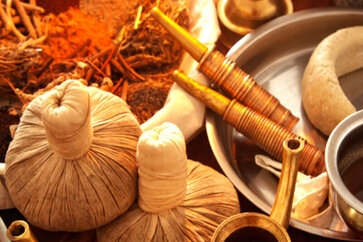Say Goodbye to Stomach Worms with These 8 Ayurvedic Herbs
Worms are organisms that can reside in the intestines of all human beings. When the population of these worms exceeds a certain threshold, they can lead to various digestive problems. These worms primarily inhabit the digestive area, specifically the intestines, where they source their nourishment.
Consequently, they are categorized as parasites, as they live within the bodies of humans, who serve as their hosts. Because worms dwell inside the body of their host, they are biologically termed parasites. These particular parasites feed on the food passing through the human digestive tract.
Throughout their entire lifecycle, these worms remain within the intestines of humans. They reproduce within the intestines, leading to an increase in their numbers.
While worms are predominantly located in the intestines, they can also be present in the stomach and the rectum. However, their prevalence is highest in the intestines, earning them the name “intestinal worms.” In the realm of Ayurveda, these intestinal worms are recognized as “Krimi Rog.”
Signs and Symptoms of Stomach Worms
Stomach worms can manifest with a range of common signs and symptoms, including:
1. Stomach ache: Many individuals with stomach worms experience abdominal pain or discomfort, often localized in the belly area.
2. Bloating: Stomach worms can cause bloating, making your abdomen feel full and distended.
3. Weight loss: Unexplained weight loss is a potential sign of a stomach worm infestation, as these parasites can interfere with nutrient absorption.
4. Loss of appetite: Infected individuals may notice a decreased desire to eat, leading to reduced food intake.
5. Weakness: Stomach worms can sap your energy and lead to a feeling of overall weakness.
6. Tiredness: Fatigue and a constant feeling of tiredness are common symptoms associated with stomach worm infections.
7. Nausea or vomiting: Nausea and occasional vomiting can occur, especially when stomach worms disrupt the digestive process.
8. Diarrhea: Some individuals may experience diarrhea, which can contribute to dehydration and further weakness.
9. Persistent cough: In some cases, stomach worm infections can lead to a persistent cough, often due to the irritation caused by these parasites.
10. Passing a worm in your stool: One of the most definitive signs is the passage of worms in your stool. This can be a clear indicator of a worm infestation.
Note: If you suspect that you may have intestinal parasites or are experiencing any of these symptoms, it’s crucial to consult a doctor promptly.
Healthcare professionals can conduct diagnostic tests, including stool examinations, to identify and treat the parasite effectively.
Early detection and treatment are essential to prevent potential complications and restore your digestive health.
What Causes Stomach Worms?
Stomach worms can be caused by various factors, including:
1. Ingesting tainted water or food: Consuming contaminated water or food is one of the primary ways stomach worms enter the body. These contaminants can contain worm larvae or eggs, which, when ingested, can develop into mature worms in the digestive tract.
2. Inadequate hygiene: Poor personal hygiene, such as not washing hands thoroughly after using the restroom or before eating, can lead to the ingestion of worm eggs or larvae inadvertently.
3. Contact with a germ-infected surface: Exposure to surfaces contaminated with germs or parasite eggs, such as playground equipment or soil, can result in the transfer of these pathogens to the hands and, subsequently, ingestion if proper hand hygiene is not maintained.
4. Contacting an infected animal: Close contact with infected animals, especially pets, can be a source of stomach worm infections. Handling animals that carry these parasites or their feces can pose a risk.
5. Handwashing that isn’t done correctly: Inadequate or improper handwashing practices can leave behind traces of parasites or worm eggs on the hands, which can then be ingested when eating or touching the face.
6. Consumption of undercooked meat: Some stomach worms, like tapeworms, can be transmitted through the consumption of undercooked or raw meat from infected animals. Proper cooking of meat is essential to kill any potential parasites.
Tips: It’s important to note that practicing good hygiene, including thorough handwashing, and ensuring the proper cooking of food, can significantly reduce the risk of stomach worm infections.
Ayurvedic Treatment For Intestinal Worms
Among the several Ayurvedic home remedies found advantageous in the healing of intestinal worms. The following herbs and supplements are suggestions that may also help as a part of your treatment plan.
Even though they are widely used for intestinal parasites, keep in mind that there has been very little study conducted into the efficiency of these supplements for intestinal parasites.
1. Coconut Water
Coconut is considered one of the most effective home remedies for treating intestinal worms. This ancient remedy has been used to eliminate various types of intestinal parasites.
To use coconut for this purpose, follow these steps:
- Take one tablespoon of freshly ground coconut during breakfast.
- After three hours, mix 30 to 60 ml of castor oil with 250 to 375 ml of slightly warm milk.
- Consume this mixture.
- Repeat this process until the treatment successfully eliminates the intestinal worms.
2. Garlic
Garlic is known for its natural anti-parasitic properties and can be used as a home remedy to help eliminate intestinal worms. Here’s how to use garlic for this purpose:
- Prepare Fresh Garlic: Peel and crush 2-3 cloves of fresh garlic. Crushing the garlic helps release its active compounds.
- Consume Raw Garlic: Eat the crushed garlic cloves on an empty stomach in the morning. You can mix it with a small amount of honey or drink water immediately after to mask the taste.
- Repeat Daily: Continue this regimen daily for at least a week to see if it helps eliminate the intestinal worms.
Garlic can be a useful natural remedy, but it may not work for everyone, and its effectiveness can vary depending on the type and severity of the intestinal worm infestation. Always consult with a healthcare provider for the best course of action for your specific situation.
3. Carrots
Carrots are known for their potential to combat specific types of intestinal parasites, like threadworms. They can be especially beneficial in eliminating threadworms in children, as these parasites find carrots unappealing.
To use carrots as a natural remedy for intestinal parasites, follow these steps:
- Morning Treatment: Take this remedy each morning on an empty stomach.
- Option 1: Ground or Mixed Carrots: Consume either 1 cup of ground or mixed carrots. You can mix them with other foods if preferred.
- Option 2: Pure Carrot Juice: Alternatively, you can drink a glass of 100% pure carrot juice.
Carrots are considered a natural and safe approach to address threadworm infestations. However, it’s important to note that if the problem persists or worsens, it’s advisable to consult with a healthcare professional for a proper diagnosis and treatment plan.
4. Papaya
The milky juice of unripened papaya contains an enzyme called papain, which is known for its effectiveness in eliminating roundworms. Here’s how to use papaya as a natural remedy for this purpose:
For Adults:
- Take one tablespoon of fresh juice from unripened papaya.
- Mix it with an equal amount of honey.
- Combine this mixture with three to four tablespoons of hot water.
- Consume this as a single dose.
Two Hours Later:
- Take a dose of 30 to 60 ml of castor oil.
- Mix the castor oil with 250 to 375 ml of slightly warm milk.
- Consume this mixture.
Repeat this remedy for two days if necessary.
- For Children Aged 7 to 10: Administer half of the above-mentioned doses.
- For Children Under 3: A tablespoonful of the mixture is sufficient.
Using unripened papaya juice with honey and castor oil is considered a natural approach to tackle roundworms. However, it’s advisable to consult with a healthcare professional, especially when dealing with children, to ensure the appropriate treatment and dosage.
5. Papaya Seeds
Papaya seeds are also effective in addressing roundworm infestations. They contain a substance called “carpaine” that is known for its effectiveness in eliminating roundworms. Here’s how to use papaya seeds for this purpose:
For Adults and Children:
- Grind the papaya seeds to make a powder.
- Take one teaspoon of the papaya seed powder.
- Mix it with one cup of either milk or water.
- Consume this mixture in the morning on an empty stomach.
This regimen can be followed daily to help eliminate roundworms.
Additionally, papaya leaves contain an alkaloid called carpaine, which also has the ability to eliminate intestinal worms. Here’s how to use papaya leaves:
Papaya Leaf Infusion:
- Take 15 grams of dry papaya leaves.
- Mix them with 250 ml of boiling water to create an infusion.
- You can add honey to improve the taste if desired.
- Consume this infusion.
Papaya seeds and leaves are considered natural remedies for roundworms, but it’s essential to consult with a healthcare professional for proper guidance, especially when using such treatments on children or if you have any underlying health conditions.
6. Pomegranate
Various parts of the pomegranate shrub, including the bark, roots, and stems, are known for their anthelminthic properties, which means they can help eliminate parasitic worms. Among these, the roots are preferred because they contain a higher concentration of the alkaloid punicine, which is effective against tapeworms. Here’s how to use pomegranate for this purpose:
For Adults:
- Prepare a cool decoction from the bark of the pomegranate shrub, preferably using fresh bark.
- Administer 90 to 180 ml of this decoction to the adult three times, with one-hour intervals between each dose.
- After the last dose, provide a laxative to aid in the expulsion of the tapeworms.
For Children:
- Children should be given a smaller dose of 30 to 60 ml of the decoction.
- Follow the same procedure with one-hour intervals between each dose.
- Administer a laxative after the last dose.
This decoction made from pomegranate bark is used as a natural remedy to expel tapeworms. However, it’s important to consult with a healthcare professional before attempting such treatments, especially for children or if you have any underlying health conditions.
7. Pumpkin Seed
Ripe pumpkin seeds are known for their effectiveness in treating intestinal worms, particularly tapeworms. Here’s how to use pumpkin seeds as a natural remedy:
For Adults:
- Take one tablespoon of ripe pumpkin seeds.
- Crush the seeds to a fine powder.
- Place the crushed seeds in a container with 250 ml of boiling water.
- Allow this mixture to steep and cool.
- Drink the infusion.
Fasting and Prune Juice:
- It’s important to fast for a day and clear the intestines by consuming the juice of boiled dry prunes.
Following Day:
- On the next day, consume three to four tumblers (glasses) of the pumpkin seed infusion.
This regimen is believed to help eliminate leeches and drive out tapeworms. However, please consult with a healthcare professional before attempting any home remedies for intestinal worms to ensure it’s safe and appropriate for your specific situation.
8. Indian Wormwood
Indian Wormwood, also known as Nagdonā, is an herbaceous plant with a long history of use as a natural remedy for expelling intestinal worms.
This plant’s effectiveness was well-recognized by the Greeks and Romans, and it continues to be used in traditional Indian (Tibbi or Unani) medicine for the same purpose.
Using Indian Wormwood for Roundworms and Tapeworms:
- Take the flowering tops of the Indian Wormwood plant.
- Powder these flowering tops.
- Administer daily doses ranging from eight to sixteen grams for the treatment of both roundworms and tapeworms.
Using Indian Wormwood Oil:
- The oil extracted from the Indian Wormwood plant also possesses worm-killing properties.
- It can be administered to address worm infestations.
Preparing an Enema with Indian Wormwood Oil:
- Mix 2 ml of Indian Wormwood oil with 120 ml of water.
- Administer this mixture as an enema to target and eliminate worms in the rectum.
Indian Wormwood has a history of use in traditional medicine for its anthelminthic properties, but it’s essential to exercise caution and consult with a healthcare professional before using such remedies, especially for specific dosages and potential side effects.
What Foods To Eat If You Have Parasites?
If you are dealing with a parasitic infection, it’s important to consider dietary changes that may support your body in fighting off parasites. Here are some foods and dietary guidelines to follow:
1. Garlic: Garlic is known for its natural anti-parasitic properties. Incorporate garlic into your meals whenever possible. You can use it in cooking or consume it raw.
2. Turmeric (Haridra): Turmeric has anti-inflammatory and antimicrobial properties, which may help combat parasites. Add turmeric to your dishes or consume it as a part of golden milk or turmeric tea.
3. Bitter-Tasting Foods: Bitter foods can help create an environment less favorable for parasites. Include bitter foods such as:
Top 16 Ayurvedic Herbs for Worms
Bitter-tasting foods are traditionally believed to have properties that can discourage the growth and presence of parasites within the body. Here’s a closer look at some of the bitter foods mentioned:
1. Ashwagandha: Ashwagandha is an adaptogenic herb known for its ability to boost the immune system. Its bitterness may contribute to creating an inhospitable environment for parasites.
2. Amalaki Leaves: Amalaki, also known as Indian gooseberry, is rich in vitamin C and antioxidants. The bitterness of its leaves may have a cleansing effect on the digestive system.
3. Ajwain (Carom Seeds): Ajwain seeds have a strong, bitter taste and are commonly used in traditional medicine to alleviate digestive issues. Their antimicrobial properties may help combat parasites.
4. Bael Fruits: Bael fruits have a slightly bitter taste and are used in Ayurvedic medicine for their digestive and anti-parasitic properties.
5. Guduchi: Guduchi, also known as Tinospora cordifolia, is an herb with bitter and immunomodulatory properties. It is believed to help strengthen the body’s defenses against parasites.
6. Aloe Vera: Aloe vera’s bitter latex has a long history of use as a natural laxative and detoxifying agent. It may help in flushing out parasites from the digestive system.
7. Garcinia: The bitterness of Garcinia cambogia, a tropical fruit, is thought to have a role in promoting digestive health and potentially discouraging parasites.
8. Kantakari: Kantakari, or Solanum xanthocarpum, is a bitter-tasting herb used in traditional medicine for its antimicrobial and digestive benefits.
9. Karela (Bitter Gourd): Bitter gourd is widely known for its bitter taste and is used to regulate blood sugar levels and improve digestion.
10. Noni (Morinda): Noni fruit is considered bitter and is used in traditional healing practices for its potential anti-parasitic effects.
11. Sarpganda: Sarpgandha, also known as Rauvolfia serpentina, has a bitter taste and is used in Ayurveda for various health purposes, including its potential to discourage parasites.
12. Kanchnar: Kanchnar is a tree with bitter-tasting bark, and its extracts are used in traditional medicine for their anti-inflammatory and antimicrobial properties.
13. Shankpushpi: Shankpushpi is a bitter herb used for its cognitive and digestive benefits in traditional medicine systems.
14. Atibala: Atibala, or Abutilon indicum, is a bitter herb used in Ayurveda for its digestive and antimicrobial properties.
15. Bakuchi: Bakuchi, also known as Psoralea corylifolia, has a bitter taste and is used in Ayurvedic medicine for various skin and digestive issues.
16. Bakula: Bakula is a tree with bitter bark, and its extracts are used for their potential anti-parasitic properties.
While these bitter-tasting foods are considered beneficial in traditional medicine, it’s important to remember that a balanced diet and overall health practices are crucial.
Tips: Avoid or limit your consumption of sugar and sugar cane juice. Parasites thrive on sugar, so reducing sugar intake can help create an environment less conducive to their growth.
Frequently asked questions on Ayurvedic herbs for worm infestations
Q1: What are Ayurvedic herbs for worms?
A1: Ayurvedic herbs for worms are natural remedies derived from plants or herbs used in traditional Ayurvedic medicine to combat various types of intestinal parasites, such as roundworms, tapeworms, and threadworms.
Q2: Are Ayurvedic herbs effective against worms?
A2: Ayurvedic herbs are believed to have anthelminthic properties, meaning they can help eliminate worms from the body. Their effectiveness may vary depending on the type and severity of the infestation.
Q3: What are some commonly used Ayurvedic herbs for worms?
A3: Some commonly used Ayurvedic herbs for worms include Neem, Indian Wormwood (Nagdonā), Papaya seeds, Pumpkin seeds, and various bitter-tasting herbs like Karela (Bitter gourd) and Ajwain (carom seeds).
Q4: How can I use Ayurvedic herbs for worms?
A4: Ayurvedic herbs for worms can be consumed in various forms, such as infusions, powders, or as part of a diet. Specific usage instructions may vary depending on the herb and the type of parasite you are targeting.
Q5: Can Ayurvedic herbs be used as a sole treatment for worms?
A5: Ayurvedic herbs can be part of a holistic approach to addressing worm infestations, but they may not always be sufficient on their own. It’s advisable to consult a healthcare professional for a proper diagnosis and treatment plan, which may include herbal remedies along with other interventions.
Q6: Are there any side effects of using Ayurvedic herbs for worms?
A6: While Ayurvedic herbs are generally considered safe, individual reactions may vary. It’s essential to use them in moderation and under the guidance of a qualified Ayurvedic practitioner or healthcare provider to avoid potential side effects or interactions.
Q7: Can Ayurvedic herbs prevent worm infestations?
A7: Ayurvedic herbs are traditionally used not only to treat worm infestations but also for their preventive properties. Maintaining a balanced diet and lifestyle that includes these herbs may help create an environment less favorable for parasites.
Q8: Is it safe to use Ayurvedic herbs for worms in children?
A8: Using Ayurvedic herbs for children should be done with caution and under professional guidance, as dosages may need to be adjusted based on the child’s age and weight. Consult a pediatrician or Ayurvedic practitioner for appropriate recommendations.
Q9: Where can I find Ayurvedic herbs for worms?
A9: Ayurvedic herbs can be found at Ayurvedic stores, health food stores, or online retailers specializing in herbal products. It’s essential to ensure the quality and authenticity of the herbs you purchase.
Q10: Can Ayurvedic herbs be used alongside conventional medicine for worm infestations?
A10: Ayurvedic herbs can sometimes complement conventional treatments, but it’s crucial to inform your healthcare provider about any herbal remedies you plan to use to avoid potential interactions or contraindications. Always consult with a healthcare professional for personalized guidance.


























